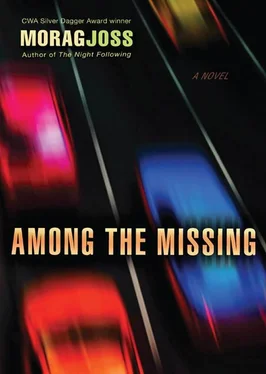“Okay.”
He pulled out the envelope from his jacket. “Two thousand,” he said.
“Three,” I insisted, numbly. I had no idea what the car was worth, no idea what I was talking about.
“Two thousand five hundred,” he said, counting it through his fingertips, bill by bill, before I could argue.
“All right,” I said.
He handed it over and pointed to the service station again. “Just up there.”
He smiled. He was anxious for me to go. But some natural courtesy-maybe even a little gratitude because I liked his daughter-prevented him from showing it.
“All right. Goodbye.”
In absolute misery, I zipped the money into an inside pocket of my shoulder bag. Just as I was turning to go, I glanced in at the child, lying aslant across the collapsed wad of bedding and beginning to stir from sleep. Seeing her father outside, she pulled herself up and patted on the window with the palms of both hands, about to cry. Stefan and I looked at each other; we both wanted to say something else, and we both started to speak at once. He tried to laugh.
“Okay. What?”
“You will remember to get her a car seat, won’t you? Today?”
He smiled and reached out and gave my shoulder a little shake. “Sure, sure, lady. Today. I will.”
“What were you going to say?”
“Nothing,” he said. He pulled out his envelope again, just as Anna began to sob, pressing her face up to the glass. “Only, here. Three thousand. Here, take,” he said, pushing more bills into my hands. Then he turned quickly to the car, and I started walking away, toward the service station. I heard him open the car door and speak gently, but I kept walking. I could not bear to see her hands outstretched for him as he lifted her into his arms.
I didn’t want to wait for the bus. It was too cold to stand in the shelter, and I wanted to get away and keep moving, putting distance between myself and what I had just done. I kept walking. Soon I had reached the bridge, and I could see that the pathway for pedestrians was separate from the road, built lower than the steel deck that carried cars; once on it I would be almost invisible except to anyone I might meet walking across from the other side. I strode along fast with my collar up against the roar of traffic and the exhaust fumes and the estuary wind. I liked the thought of being hidden. After a few minutes, the bus rumbled on past me.
Looking inland, I could see all the way to the point where the river emerged from the neck of the loch, and turning eastward, I saw as far as it ran, past the docks and the city, and widened into the sea. As I walked, in each direction the views hit my eyes like old, stuttering film as the black spars of the bridge flickered past between me and the landscape.
At the first junction on the far side, where nearly all the traffic bore right to go north and up the coast, I turned left and followed a much narrower road that rose and curved inland. The signs pointed toward Netherloch Falls and Netherloch. The paved walkway from the bridge came to an end, and I continued along the side of the road, suspended in wintery afternoon darkness; the way was canopied by overhanging trees, through which blinding slashes of daylight cut until they stood too densely planted for light to penetrate. After a while I could only sense but not see the river, a long way beyond the trees and below me. One or two cars passed, leaving hollow echoes of engine noise. As the road rose ahead of me, I could tell I was going higher; soon I heard a faraway rushing in the treetops and the air was cold with pine resin and raw mountain winds that carried none of the green, reedy damp of the river. I came upon the remains of a clearing where trees had been felled in an apparently disordered kind of order: straight rows of sawn stumps poked up between tractor ruts that receded back into the line of the forest. Everywhere the ground was scattered with shards and chips of torn wood and the scabs of stripped bark. Dozens of tree trunks lay stacked parallel, and around them were stiff, feathery heaps of smaller pine cuttings alongside dried-out branches and twigs, gray and tangled like wires.
I had been walking for nearly an hour and had a stitch in my side, and I stopped to rest against a mound of logs, digging my foot into a mulchy carpet of pine needles and moss. I was scared and cold, and sick with disgust at myself; I stared into the darkness of the trees and wanted to escape into it. Just then I heard another bus. Without thinking, I ran back to the road and waved it down. I climbed on breathless and shivering and wondered if I was getting flu. By the time we reached Netherloch, I ached with tiredness and the afternoon had turned cloudy and raw. It was only a quarter past two. I knew I could not bear nearly four hours loitering in the streets, going from one café to another. I had to get into a quiet room and lie down, I had to sleep.
The sign on the front of the bus said WESTER MUIR/FORT AUGUSTUS, which I knew were some miles west beyond our hotel, so I clambered down to the driver and paid the extra to go on to Invermuir where, he told me, the bus stopped at the postbox on the far side of the village from the hotel. Col would not be back before six o’clock. I could hide in our room for at least two hours, and later I would get back somehow to Netherloch. If there wasn’t another bus I could get a taxi, and if I didn’t get there until after six it wouldn’t matter; in fact, it would help, it would give Stefan even more time. We would be safe. But I didn’t know what safe meant anymore. I opened my bag and flicked the money through my fingertips, powdery, soft paper amounting to three thousand pounds. Just paper, after all, but I was trusting to it to buy me my safety.
I stared through the bus window and tried to distract myself by identifying the plants along the road. Gorse, bracken, patches of rushes, and spongy, brownish pads of composting nettles and saturated moss. I was collecting observations that I could array before Col one by one, to fill our evening before I mentioned the baby and the money. Then I would tell him that I had solved the problem, that there was now plenty of money so there was no need to worry. He would love his child when it arrived, and anyway, I would take care of everything. Soon I found myself in a pitiful daydream in which kindness and remorse and enlightenment washed over his face, and henceforth we moved on together toward a sweetly melancholic, poetic future as Mummy and Daddy. I modified the daydream; at some later date, next year maybe, I would be pregnant again. If it happened at forty-two, it could surely happen at forty-three, and it would be different next time, because making the best of one accidental baby was one thing, having a second quite another, undertaken only by devoted and deliberate parents. By then I would, as a mother, be well acquainted with anxiety about the world at a level previously unimaginable, but I would be watchful and capable, too, and our happy children would-I whispered the very words-make our happiness complete. This was a manageable and familiar dream to me, set in a future in which I was altered, having blossomed in my husband’s eyes and acquired proper, wifely value as a person whose wisdom and clarity about life were necessary to him. I concentrated on it for the rest of the journey.

The store wasn’t busy; lunchtimes never are. A few campers from the Lochside Holiday Cabins were coming in at the weekends now but still hardly any during the week, and they usually stocked up early in the day. The bus stopped outside at two o’clock, on time. Nobody got off. Around the same time some fishermen came in to fill up their flasks from the vending machine. They told me again we should be selling soup and hot pies. Get a microwave and you could do it easy, you’d make a fortune this weather, they said.
Читать дальше













